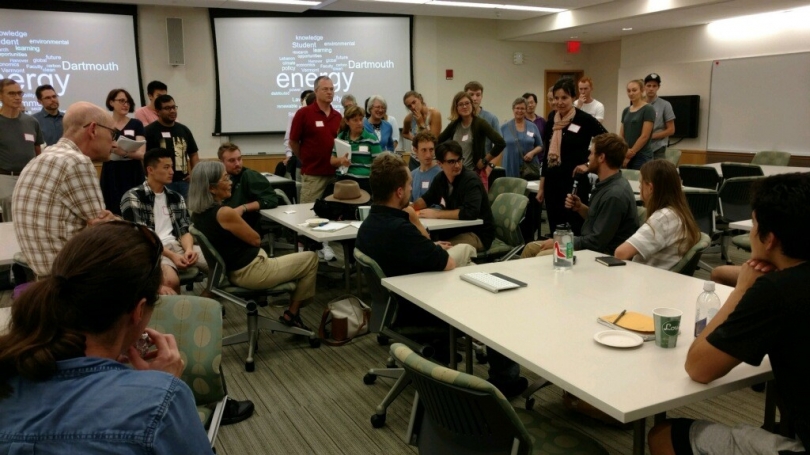
- About
- Education
- Research
- Thought Leadership
- Engagement
- News & Events
Back to Top Nav
Back to Top Nav
Back to Top Nav
Back to Top Nav
This fall, the Irving Institute and partners in the Dartmouth Energy Collaborative launched the first "Energy 101" series to provide an "ankle-deep" introduction to energy to a wide audience. This series was open to students, faculty, and community members from all disciplines and perspectives, and participants were indeed diverse -- yet they all shared a common sense of curiosity and a desire to learn. "Energy 101" laid out the foundations of energy and society studies – with sessions addressing topics ranging from basic thermodynamic concepts to stories of real-world renewable energy transitions.
This fall, the Irving Institute and partners in the Dartmouth Energy Collaborative launched the first "Energy 101" series to provide an "ankle-deep" introduction to energy to a wide audience. This series was open to students, faculty, and community members from all disciplines and perspectives, and participants were indeed diverse -- yet they all shared a common sense of curiosity and a desire to learn. "Energy 101" laid out the foundations of energy and society studies – with sessions addressing topics ranging from basic thermodynamic concepts to stories of real-world renewable energy transitions.
Every participant brought a unique background and level of experience to the program, contributing to a collaborative and immersive learning experience. Speakers were engaging and ensured that participants left each session with a more holistic view of energy systems in action.
One highlight of the series was Professor Erin Mansur's talk and simulation on energy economics. He led the group in an experiential exercise to demonstrate the deeply challenging nature of issues such as the impact of carbon taxes on wholesale energy prices and the implications of incorporating variable energy sources, such as wind or solar, into the electricity grid. Another highlight was a panel discussion among three members of the IIES Advisory Board -- J. Drake Hamilton, Nancy Malmquist, and Dan Reicher – who brought critical issues associated with energy financing and renewable policy development to light.
The closing session on November 6 engaged participants (after they visited the polls) in reflection on what they learned throughout the series. Table groups sketched out concept maps of a sustainable energy transition and each group presented and discussed their ideas. This exercise illustrated how seemingly disparate topics converge to shape the future of energy. As the session wrapped up, a strong shared sense of community and optimism was tangible. One individual observed that "this was a great opportunity for town and gown to connect...the people in this room know an awful lot and it's humbling to see the collective backgrounds here tonight." According to another, "these sessions were diverse, useful, interesting...and you all brought it to life! Thank you for all the work you did in creating this course."
This series was highly sought-after; registration filled up almost immediately. The DEC team looks forward to offering the series again in 2019 – sign up for the DEC list to receive more information as soon as it is available.